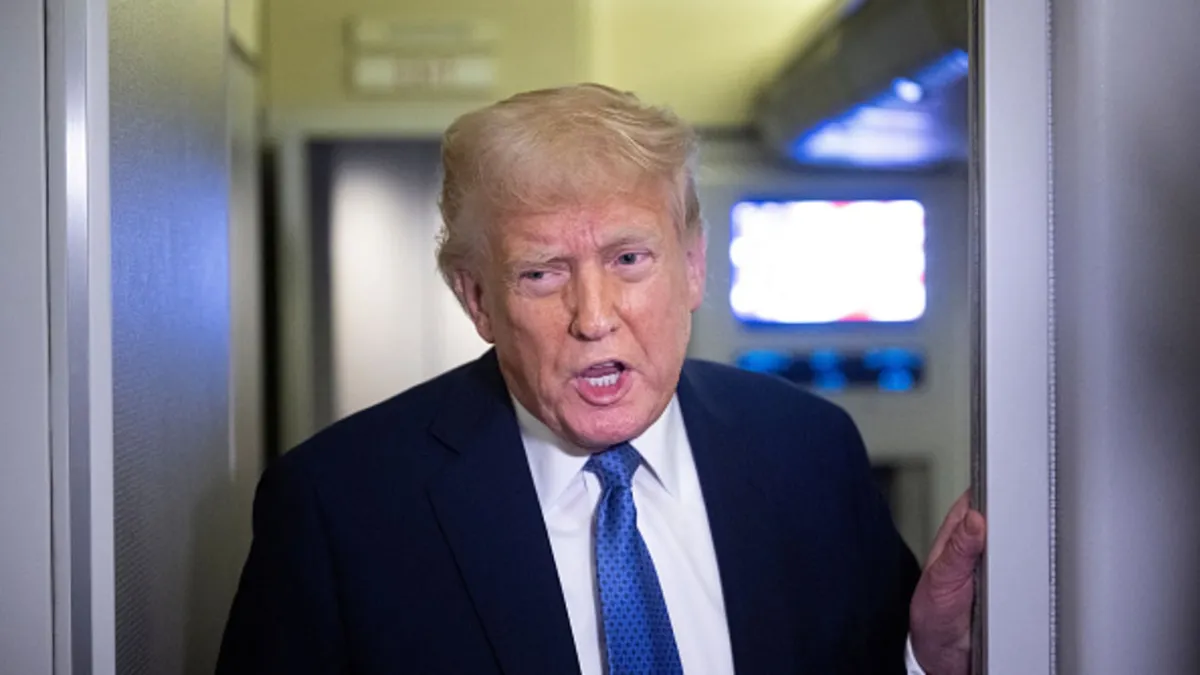
In a significant development, U.S. President Donald Trump announced his intention to speak with Russian President Vladimir Putin on Tuesday, aiming to address the ongoing conflict in Ukraine. This announcement follows a series of constructive talks between U.S. and Russian officials in Moscow. Speaking to reporters aboard Air Force One during a flight from Florida to Washington, Trump expressed hope for a resolution, stating, "We want to see if we can bring that war to an end. Maybe we can, maybe we can't, but I think we have a very good chance." He emphasized that substantial work has been accomplished over the weekend leading up to this critical conversation.
Trump is advocating for a 30-day ceasefire proposal, which Ukraine accepted last week. This proposal comes as both sides continue to engage in heavy aerial strikes, with Russian forces making advances to displace Ukrainian troops from their established positions in the western Russian region of Kursk. As of now, there has been no immediate response from the Kremlin regarding the ceasefire discussions, despite previous communications from Putin through U.S. envoy Steve Witkoff, who conveyed cautious optimism about reaching a deal to conclude the three-year war.
During separate appearances on U.S. television shows, U.S. Secretary of State Marco Rubio and National Security Adviser Mike Waltz highlighted the significant challenges that still lie ahead before Russia may agree to a ceasefire. When asked on ABC whether the U.S. would accept a peace deal allowing Russia to retain control over parts of eastern Ukraine, Waltz responded, "Are we going to drive every Russian off of every inch of Ukrainian soil?" He underscored the necessity for negotiations to be grounded in reality.
Rubio echoed this sentiment during his CBS appearance, stating that achieving a final peace deal will require hard work and concessions from both Russia and Ukraine. He cautioned that initiating meaningful negotiations would be challenging as long as hostilities persist.
Ukrainian President Volodymyr Zelenskiy expressed optimism about the potential to end the conflict after Kyiv's acceptance of the U.S. proposal for a temporary ceasefire. However, Zelenskiy has firmly maintained that the sovereignty of Ukraine is non-negotiable and that Russia must withdraw from the territories it has occupied, including Crimea, which Russia annexed in 2014, and several eastern Ukrainian regions following its 2022 invasion.
As discussions around a ceasefire continue, Ukraine's allies in Europe and Britain have reiterated that any peace agreement must involve direct negotiations with Ukraine. British Prime Minister Keir Starmer indicated that Western allies, aside from the U.S., are enhancing preparations to support Ukraine should a ceasefire occur. Defence chiefs are expected to finalize robust plans next week, with both Britain and France expressing readiness to deploy a peacekeeping force to monitor any ceasefire agreement.
However, Russia has dismissed the idea of peacekeepers being deployed in Ukraine until the conflict officially concludes. Russian officials have stated that the presence of NATO forces, regardless of designation, would signify their involvement in the conflict. Grushko, a Russian official, remarked, "If they appear there, it means that they are deployed in the conflict zone with all the consequences for these contingents as parties to the conflict." He suggested that discussions could include unarmed observers or civilian missions to monitor specific aspects of any agreement, but labeled other proposals as mere "hot air."
French President Emmanuel Macron weighed in on the issue, declaring that the decision regarding the placement of peacekeeping troops in Ukraine should be made by Kyiv and not dictated by Moscow. This stance reflects a growing international consensus that Ukraine's sovereignty and territorial integrity must remain at the forefront of any discussions aimed at ending the conflict.